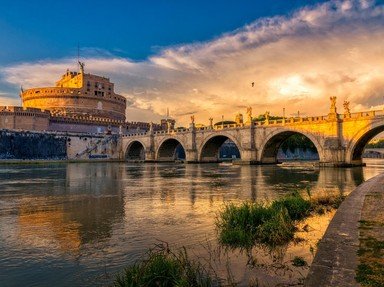Quiz Answer Key and Fun Facts
1. Back in ancient times, Rome wasn't exactly a pioneer for civil rights. What percentage of Rome's population was made up of slaves?
2. What was the name of Gaius Julius Caesar's (alleged) son?
3. Ancient Romans worshipped a variety of gods, most of whom were adopted from the Greek deities. Bacchus was the Roman name for which Greek god?
4. The highest political office to which a private Roman citizen could hope to aspire was that of consul. After being elected, how long did a consul hold office?
5. Chosen emperor after the tumultuous Year of the Four Emperors, Titus Flavius Sabinus Vespasianus was the first of the Flavian dynasty and considered by his subjects to be a good ruler. Which of the following did NOT take place during his reign?
6. "I came, I saw, I conquered," is perhaps the most famous quote of any Roman (and "Friends, Romans, countrymen, lend me your ears" doesn't count). It was uttered by Julius Caesar August 2nd of 47 B.C. after defeating ______ .
7. The city of Rome is located on the _______ .
8. A Roman citizen's place in society could be revealed by his name, or 'tria nomina'. What does this phrase mean?
9. Though in general Romans did not make medical advances, they did make significant contributions in which area?
10. During the time of Julius Caesar, a legionary--the primary Roman soldier--served how many years?
Source: Author
FuzzyElf
This quiz was reviewed by FunTrivia editor
bloomsby before going online.
Any errors found in FunTrivia content are routinely corrected through our feedback system.

